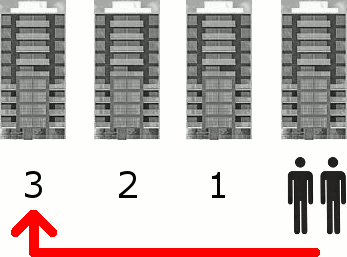Через (часть пятая)
Now here's where the preposition через gets really, really interesting. Observe the following interaction and its translation. The context is a conversation that occurs in a subway car between two subway stops.
| — Мне нужен «Дом книги». Мне выйти на этой станции? — Нет, Вам выходить через одну станцию. |
“I need [to get to the store] ‘Book House’. Should I get off at this station?” “No, you should get off at the second station.” |
Despite the fact that the original contains the word одну “one,” and the translation contains the word “second,” the translation is not an error. The word через means “through,” so the idea is that you need to ride through the upcoming station and get off at the one that follows. Here's another example. The context is two acquaintances standing in front of a building.
| — Саша живёт в этом доме? — Нет, вон там, через два дома. |
“Does Alexandra living in this building?” “No, over there, the third building.” |
«Через два дома», translated word for word, means “through two buildings.” Here the idea is that it's not the building in front of you where Alexandra lives. You need to pass by two buildings, and then you will find the right one. Not that first building, not the second one, but the one after that. And the most concise way to say that in English is with the phrase “the third building.”

This is one of those places where we see that not all languages say things the same way. If you want an English translation of this construction that is concise and sounds natural, then you have to add one to the number that was used in the Russian sentence.
I want to impress upon you how important this concept is. People with no foreign language experience, or language experience only in closely related languages, will assume things like, “If it says ‘five’ in the original, and it doesn't say ‘five’ in the translation, then the translation is wrong.” They may be mistaken. Sometimes a target language simply says things in a different way than the source language, even in such ways that require a change of numbers in the target language.
Let me summarize: if a source text does not correspond word for word with its translation into another language, that does not necessarily mean that the translation is wrong. This may even apply to sentences that contain words that at first glance seem to have an unchangeable meaning (like numbers). Sometimes the little functional words that coordinate everything else throw a wrench into the system and have to be taken into consideration.
1 comment
Interesting stuff. Speaking of how things are different in different languages, I think everyone interested in language and/or philosophy should read Metaphors We Live By, by Mark Johnson and George Lakoff. The authors show how the ways we think and use language necessarily involve extensive schemes of metaphors. These metaphors are often different in different cultures, so the sorts of issues you bring up in this post should be considered par for the course in studying a foreign language.
Form is loading...